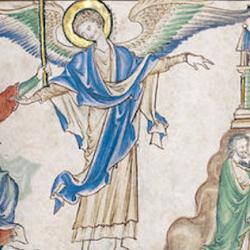Revelation 18 falls out in a fairly neat chiasm:
A. Angel descending and illuminating the earth: announcing fall, 1-3
B. A second voice: Get out because of the double retribution for her sins, vv 4-8
C. Kings lament, vv 9-10
D. Merchants lament, vv 11-17a
C’. Shipmasters and sailors lament, vv 17b-19
B’. heaven rejoices, v 20
A’. strong angel, vv 21-24
The matches are pretty strong:
A/A’: Both of these sections introduce an angel, both of whom speak, and both of whom speak of “Babylon the great” (vv. 2, 21). Verse 3 speaks of the “wine of the passion of immortality,” while verse 24 clarifies that the harlot’s wine is the blood of the prophets and apostles that is charged against Babylon (cf. Matthew 23). The first angel illuminates the earth (v. 1), while the strong angel announces that Babylon’s lights are going out (v. 23).
B/B’: In both, there is an unidentified voice. In verse 4, the voice exhorts the faithful to leave the city, and in verse 20 a voice calls on the heavens to rejoice. Both refer to the judgments of God (vv. 8, 20).
The central three sections are all parallel – it could have been C, C’, C”. Each section introduces a new group (kings, merchants, shipmasters), each of which stands at a distance from Babylon out of fear of sharing her destruction (vv. 10, 15, 17-18). Each ends with a double woe over “the great city” (vv. 10, 16, 19). I distinguished C/C’ from D because the merchant section is three times as long and thus stands out from the other two lamentations.
The final words of the strong angel list six things that will “be no more”:
1. The city, v 21
2. Sound of music, v 22a
3. Craftsmen, v 22b
4. Sound of millstone, v 22c
5. Light of lamb, v 23a
6. Sound of bride and groom, v 23b
This is a standard prophetic destruction of a desolated city (cf. Jeremiah 7:34; 16:9), but it is put together neatly. Items 2, 4, 6 all emphasize the silencing of sound, the sounds of worship and performance, the sound of labor, and the sound of family, kin, joy, and marriage. The city is largely a sonic space, and when the city becomes a desert its sounds end. The others are generally visual (the city and craftsmen are “no more found “). Though this decreated city doesn’t fully match the days of creation, the fact that the series ends, on the sixth item, with the bride and bridegroom, suggests an inversion of Eden. The final clause of verse 23 might be considered a “seventh” in the series: Instead of Sabbatical worship, the harlot offers sorceries that deceive the merchants and great men of the earth.
The contrast between the silence of the city and the loud cries of the angel (18:2) and the hosts of heaven (v. 20) is noteworthy. When God gives the wicked their deserts, many on earth lament, but heaven resounds with praise.










